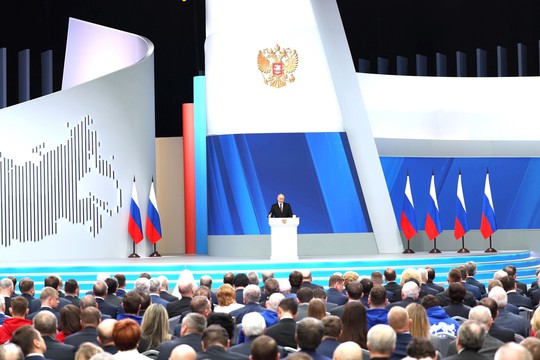Photo: Kremlin.ru
President of Russia Vladimir Putin delivered his Address to the Federal Assembly. The ceremony took place in Gostiny Dvor, Moscow. February 29, 2024. Main points on the development of Russia:
- Incidentally, friends and colleagues, I am sure that many of you have been to the Russia exhibition. People go there to see how rich and vast our homeland is and to show this to their children. The Year of the Family has been launched there. The values of love, mutual support and trust are handed down from generation to generation, just like our culture, traditions, history, and moral principles.
- But the main purpose of the family is to have children, to procreate, to bring up children and hence to ensure the survival of our multi-ethnic nation. We can see what is taking place in some countries where moral standards and the family are being deliberately destroyed and entire nations are pushed to extinction and decadence. We have chosen life. Russia has been and remains a stronghold of the traditional values on which human civilisation stands. Our choice is supported by the majority of people in the world, including millions in Western countries.
- What we need is an uninterrupted effort aimed at improving the quality of life of families with children and supporting the birth rate. To achieve this goal, we will launch a new national project titled “Family.”
- First, in addition to federal programmes, Russian regions are implementing their own measures to support families with children… In 2022, 39 regions had a total fertility rate below the national average. By the end of 2030, we will channel at least 75 billion rubles to these regions so that they can increase their family support programmes. The funds will begin to be disbursed next year.
- I signed an executive order creating a single national status for families with many children. This is what people have been asking for. We must follow up on its provisions by taking concrete federal and regional decisions in keeping with people’s aspirations, of course.
- Families with many children have so many matters they have to take care of, so parents must have more resources on hand to deal with their everyday challenges. I suggest doubling the tax deduction parents get when having their second child to 2,800 rubles per month and increasing this benefit for the third and every consecutive child to 6,000 rubles.
- On a separate note, I would like to mention the maternity capital benefit. Today, parents can receive 630,000 rubles when their first child is born, and when the second one arrives, the family gets another 202,000 rubles. We have regularly adjusted this benefit for inflation. For now, the maternity capital programme is set to expire by early 2026, but I suggest extending it until at least 2030.
- Presently the average life expectancy in Russia has exceeded 73 years. We have returned to the level we were at before the COVID-19 pandemic. By 2030, life expectancy in Russia should be at least 78 years, and in the future, as we planned, we will reach the level of 80 plus.
- We will continue to implement federal projects to combat cardiovascular diseases, cancer, and diabetes.
- Furthermore, I propose launching a new comprehensive programme to protect motherhood and help children and adolescents maintain good health, including their reproductive health, ensuring that children are born healthy and grow up to be healthy adults, and produce healthy children in the future.
- The number of Russians who engage in sports activities on a regular basis has increased significantly in recent years. This is one of our major achievements. We need to encourage people who take responsibility for their own health. As early as next year, we will introduce tax deductions for those who regularly undergo scheduled medical examinations, as well as successfully pass the standard GTO physical fitness test.
- I suggest channelling federal money into building at least 350 additional sports facilities every year in the regions, primarily in small towns and rural areas. This could include multi-purpose venues, as well as structures that can be erected quickly to be used by children, adults, and families. We will allocate some 65 billion rubles in federal money to this effect over the next six years.
- I propose consolidating the positive experience we have achieved with our youth policy and launching a new national project this year, the Youth of Russia. This project should focus on our country’s future and work towards that future. This is what our schoolteachers see as their calling, their grand mission, as they realise that they are responsible for younger generations, and we are grateful to them for their selfless work.
- A separate issue has to do with creating additional incentives for attracting young professionals to schools where they will see professional and career opportunities. Towards this end, we will approve targeted allocations of over 9 billion rubles from the federal budget for improving the infrastructure of teacher training universities.
- Our system of school education has always been famous for its innovative teachers and unique teaching methods. It is teams of such teachers that will take part in creating forward-looking schools. The construction of the first leadership schools of this kind will begin this year in the Ryazan, Pskov, Belgorod, Nizhny Novgorod, and Novgorod regions. They will subsequently be built in all the federal districts, in the Far East, Siberia, and Donbass. Overall, we will open 12 such schools by 2030.
- Last year, Russia's economy grew faster than the world economy, and we outperformed not only the leading EU countries, but all G7 economies as well. Here is what I would like to note in this regard: the massive reserves created over the past decades have had much to do with that.
- The share of non-commodity industries in the growth structure now stands at well over 90 percent, which means that the economy has become more complex and technological, and thus, much more sustainable. Russia is Europe's largest economy in terms of gross domestic product and purchasing power parity, and the world’s fifth largest economy.
- The pace and, most importantly, the quality of growth make it possible to hope and even assert that we will be able to take another step forward in the near future and become the world’s fourth largest economy. This kind of growth should have a direct effect on household incomes.
- Russia has a large young generation. Strangely enough, we are facing demographic issues related to population growth, but still have a fairly large young generation.
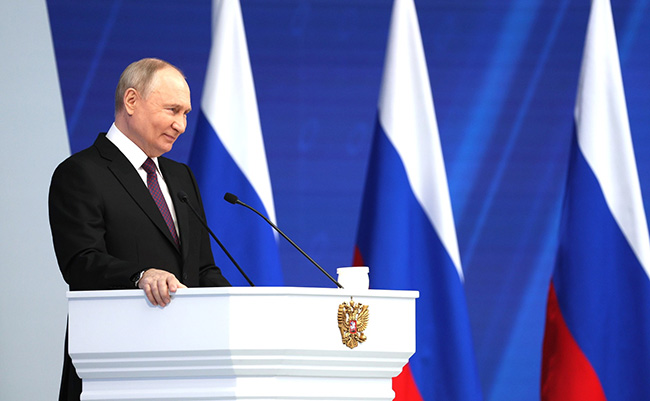 Photo: Kremlin.ru
Photo: Kremlin.ru
- Importantly, today's teenagers should become professionals primed to work in the economy of the 21st century. This is the focus of the new Personnel national project.
- A career guidance system has been launched in all schools nationwide this year. Sixth-graders and up can get familiar with different specialties.
- I am now urging the heads of enterprises, research and medical centres to encourage schoolchildren to visit them. Let them see the workshops, like I was offered to do during one of my trips, the museums, and laboratories. Please make sure to join in this effort.
- Promoting close cooperation between educational institutions and the real economy has guided us in the Professionalitet project for promoting vocational training. It enabled us to update educational programmes for the aviation, shipbuilding, pharmaceutical, electronics, and defence industries, among others.
- We will have to train about a million highly skilled workers for these sectors by 2028, while making sure that the vocational training system as a whole transitions to these approaches, including in terms of developing human resources for schools, hospitals, outpatient clinics, the services sector, tourism, cultural institutions and creative industries.
- As for higher education in general, our task is to develop research and educational centres all across our country. For that, we will build 25 university campuses by 2030. We have already discussed this but it bears repeating. I suggest that we expand this programme to build at least 40 student campuses of that kind.
- To do so, we will have to allocate some 400 billion rubles from the federal budget in order to ensure that students, post-graduates, faculty members and young families have all they need to study, work and bring up their children.
- It is important for us to bolster the capabilities and quality of the national higher education system, to support universities that are striving for development. These targets are being met by our Priority 2030 programme. The funding for this has been allocated through the end of this year. I certainly propose extending it for another six years and allocating an additional 190 billion rubles.
- The efficiency criteria for participating universities should include personnel and technology projects with Russia’s regions, industries and social sector, the creation of effective innovative companies and start-ups, and the ability to attract foreign students. In addition, we will certainly assess all Russian universities, colleges, and technical schools by the demand for their graduates from the labour market and their pay growth.
- I would like to say a few words about the technological foundation for development, and here, science is certainly the cornerstone. At a meeting with scientists from the Russian Academy of Sciences, which marked its 300th anniversary this year, I said that, even during the most difficult periods, Russia has never given up on addressing its fundamental imperatives, has always thought about the future, and we must do the same now. As a matter of fact, we are trying to do exactly that.
- For example, no other country in the world has such a range of mega-science facilities as Russia has today. These centres provide unique opportunities for our scientists and for our partners, researchers from other countries, whom we invite for collaboration.
- Russia’s scientific infrastructure is our strong competitive advantage, both in the context of fundamental research and in creating innovations for pharmaceuticals, biology, medicine, microelectronics, chemicals, and new materials, as well as for space programmes.
- I believe that we should more than double the total public and private investment in research and development, to as much as two percent of GDP by 2030. This should secure Russia’s place as one of the world’s leading scientific powers.
- I would like to reiterate that private business should simultaneously increase investment in science, at least doubling the current programmes by 2030.
- In light of the current goals and challenges, we have adjusted Russia’s Strategy for Scientific and Technological Development which we use as a starting point to launch new technological sovereignty national projects. I will give you a list of the main areas.
- First, we must be independent and own all the technological keys in sensitive areas, such as safeguarding public health and ensuring food security.
- Second, we need to attain technological sovereignty in critical spheres that determine the resilience of our economy in general, such as means of production and machine tools, robotics, all modes of transport, unmanned aerial, underwater and other systems, data economy, innovative materials and chemistry.
- Third, we must create globally competitive products relying on unique domestic innovations, including space, nuclear and new energy technologies. We must start working now to create a legal environment that fosters industries and markets of the future, to generate long-term demand − at least through the end of the current decade − for high-tech products so that companies have consistent rules to play by.
- To reiterate, we are talking about a strategic foothold for the future, so let us use all available development tools and mechanisms to achieve these objectives, and to ensure priority budget financing. I urge the Government and the Federal Assembly to be mindful of this when drafting the budget. Please always treat this as a top priority.
- Technological sovereignty projects should become an engine to renew our industry and help the entire economy reach an advanced level of efficiency and competitiveness. I propose setting the goal of increasing the share of domestic high-tech goods and services on the domestic market by 150 percent within the next six years, and increasing the volume of non-commodity and non-energy exports by at least two-thirds.
- I will cite a few more figures. In 1999, the share of imports in our country reached 26 percent of GDP meaning that imports accounted for almost 30 percent of our market. Last year, it was 19 percent of GDP, or 32 trillion rubles. Before 2030, we need to reach a level of imports of no more than 17 percent of GDP.
- This means that we must produce ourselves many more consumer and other goods, including medicine, equipment, machine tools, and vehicles. We are unable to produce everything, and we do not need to, but the Government knows what it needs to work on.
- I would like to point out that in the next six years the gross added value in manufacturing should increase by at least 40 percent compared to 2022. This accelerated industrial development implies the creation of thousands of new enterprises and modern highly paid jobs.
- Today, in Russia we build about four million square metres of industrial floorspace every year. It is a substantial indicator of the modernisation of our industrial capacities as it is, and we will additionally build 10 million square metres, as I have stated.
- Next, we will invest 300 billion rubles in the Industrial Development Fund.
- We will continue to develop industrial technology parks focused on small and medium-sized companies in the priority technological spheres. It is important to make use of the advantages of the cluster approach, when companies grow together with their subcontractors and suppliers, and their cooperation will have a beneficial effect on all parties. I would like to point out to the Government that we must create at least 100 such platforms by 2030. They will act as growth points throughout the national territory and encourage investment.
- We have set a goal to add 70 percent to investment in key sectors by 2030… In 2021, the cumulative growth of investment was 8.6 percent, against a target of 4.5 percent. In 2022, it was 15.9 percent, with a target of 9.5 percent. In the first nine months of 2023, the increase was 26.6 percent, when the plan for the year was 15.1 percent. We must continue to move ahead of the plan.
- Again, the Russian stock market needs to play a bigger role as a source of investment. Its capitalisation should double by 2030, from the current level to 66 percent of GDP. At the same time, it is important that individuals have the opportunity to contribute to the nation’s development while also benefiting from investing their savings in low risk projects.
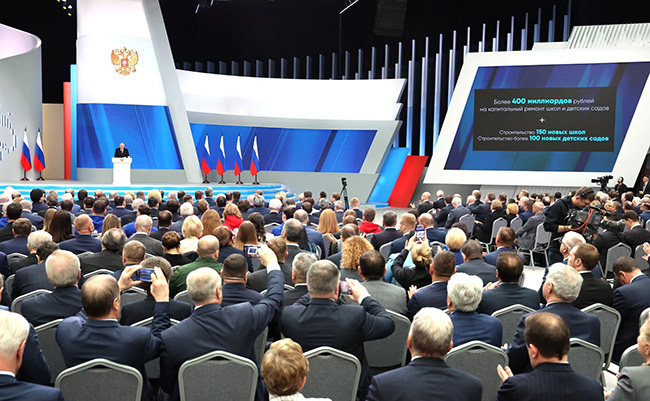 Photo: Kremlin.ru
Photo: Kremlin.ru
- Of course, as a matter of principle, Russian companies must operate within our national jurisdiction and refrain from moving their funds abroad where, as it turns out, you can lose everything. So now, my colleagues from the business community and I have to hold brainstorming sessions for coming up with ways to help them get their money back. Do not transfer your money there in the first place. This way, we will not have to figure out how to recover it.
- Russian businesses must invest their resources in Russia, its regions, in developing companies and staff training. Our strong and sovereign country offers them unrivalled protection for their assets and capital.
- An overwhelming majority of business leaders prioritise national interests and are patriots. Therefore, businesses working here in Russia must benefit from the guaranteed inviolability of their property, assets, and new investments. Of course, domestic investment and protecting investment go hand in hand with defending the rights of business owners, and it is our job to make this a reality. This will serve our national interests and society at large, as well as the millions of people who work for private companies, whether they’re large corporations or SMEs.
- We are now fully self-sufficient in terms of food, and Russia is the leader on the global wheat market. We are among the top 20 food exporters. I thank agricultural workers, farmers, and specialists engaged in agriculture in general for their impressive performance.
- By 2030, the output of the Russian agro-industrial complex should grow by at least a quarter compared to 2021, and exports should increase by 50 percent. We will definitely continue to support the sector and the programme of integrated rural development, including renovation and modernisation of post offices.
- In today’s conditions, increasing efficiency in all spheres of labour productivity is directly connected with digitalisation and the use of AI technology, as I said. Such solutions enable us to create digital platforms for streamlining interaction between people, businesses and the state in the best possible way.
- So, we need to create a platform that will help people use the capabilities of our healthcare system to keep their health in check and remain healthy throughout their life. For example, they will be able to use data from their digital identities to remotely request and receive advice from specialists at federal medical centres, and general practitioners will be able to form a comprehensive picture of a patient’s health, forecast possible illnesses, prevent complications, and choose individual, and thus, more effective treatment.
- I believe that by 2030 we must formulate digital platforms in every major economic sector and in the social sphere. These and other comprehensive tasks will be addressed within the framework of the new national project The Economy of Data. We will allocate at least 700 billion rubles to implement it in the next six years.
- Russia is actually one of the world leaders in digital government services already. Many countries, including European ones, have yet to reach our level. But we have no intention of slowing down.
- Artificial intelligence is an important element of digital platforms. Here, too, Russia must be self-sufficient and competitive. An executive order has already been signed approving the updated version of the National Strategy for the Development of Artificial Intelligence. The document sets new goals, including the need to ensure technological sovereignty in such revolutionary fields as generative artificial intelligence and large language models. Practical application of such systems promises to produce a real breakthrough in the economy and social sphere, and so it shall. For this we need to increase our computing resources. By 2030, the total capacity of domestic supercomputers should be at least 10 times greater. This is a completely realistic goal.
- We need to upgrade the entire infrastructure of the data economy. I would like to ask the Government to propose specific measures to support companies and start-ups that manufacture data storage and processing equipment and develop software. Investment in domestic IT should grow at least twice as fast as overall economic growth.
- Conditions need to be created to allow Russians to take advantage of digital technology not only in megacities, but also in smaller towns, in rural communities and in remote areas, along federal and regional thoroughfares, as well as local roads. I am referring to the need to provide access to high-speed internet almost everywhere in Russia within the next decade. To address this task, we will need to considerably expand our satellite constellation, for which we will be allocating 116 billion rubles.
- We will also extend, until 2030, the national competition for best projects to create a comfortable urban environment in small towns and historical communities.
- In total, we will improve more than 30,000 public spaces in Russia in the next six years. I would like to ask the Government to provide additional support to the regions that are renovating local embankments, parks, gardens and historical downtown areas. We will allocate 360 billion rubles for major landscaping and improvement projects like this.
- I suggest developing a long-term programme for preserving Russia’s cultural heritage sites, and I hope it will cover a 20-year period and include support measures for people, companies, and public associations willing to invest their work, time and money into restoring landmarks.
- We will make sure to keep major culture-related projects running by continuing to fund them. We will undertake infrastructure upgrades for museums, theatres, libraries, clubs, arts schools and cinemas. Creative cinematic, online and social-media projects in education, awareness building, history and other areas will receive over 100 billion rubles over the next six years.
- We will develop public transport considering today’s environmental standards and lower its average age. The Russian regions will receive an additional 40,000 buses, trolleybuses, trams, and electric buses by 2030. We will allocate an additional 150 billion rubles from the federal budget for this public transport renewal programme.
- As you know, we have managed to reduce harmful emissions in the atmosphere in 12 industrial centres of Russia as part of the Clean Air project, with 29 more cities having joined it last year. The volume of harmful emissions into the atmosphere across the country must be halved. We will move towards this goal step by step. A comprehensive environmental quality monitoring system will be created to assess the results.
- Overall, we will continue clearing the most hazardous sites of accumulated environmental damage. In the next six years, at least 50 of these sites must be cleared.
- It is necessary to create incentives for businesses, introduce green technologies, and switch to a circular economy. Moreover, we have in fact created an advanced waste management industry from scratch: 250 enterprises have been built to process and dispose of waste. The goal by 2030 is to sort all solid waste and everything that needs to be sorted and reuse at least a quarter of it. We will allocate additional financing for these projects, and together with businesses we will build about 400 new waste management facilities and eight eco-industrial parks.
- A very important milestone – since 2021, Russia has been restoring more forestland than it clears. I would like to thank all the volunteers, school and university students and everyone who planted trees and took part in environmental activities, and, of course, businesses that supported such projects. We will certainly continue restoring forests, parks and gardens, including those surrounding metropolitan areas and industrial centres.
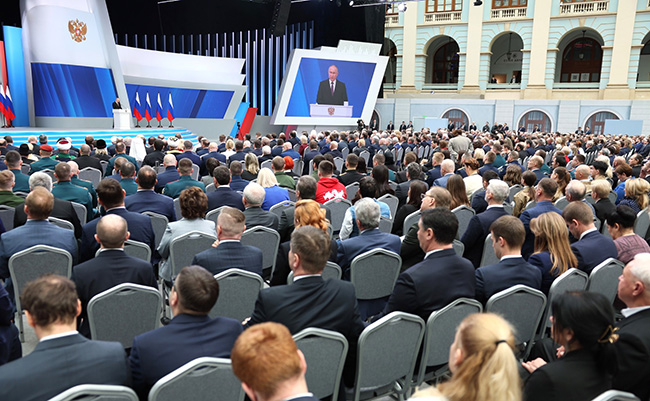 Photo: Kremlin.ru
Photo: Kremlin.ru
- We will continue working to preserve specially protected natural areas, as well as protect and restore populations of rare and endangered species of flora and fauna. I suggest considering the opening of a network of centres for rehabilitating injured and confiscated wild animals.
- By 2030, we will create infrastructure of environmental tourism in all national parks of the country, including eco-trails and tourist hiking routes, weekend tours for schoolchildren, outdoor recreation areas, museums and visit centres.
- We will build modern safe facilities near bodies of water as well, including Lake Baikal. A year-round resort will open there by 2030. It is important to strictly adhere to the zero pollution principle, that is, to ensure that no waste or untreated sewage of any kind enters the lake. The construction of the Baikal resort will be part of the large project of the Five Seas.
- Modern hotel complexes will also appear on the coasts of the Caspian Sea, the Baltic Sea, the Sea of Azov, the Black Sea and the Sea of Japan. This project alone will make it possible to add another 10 million tourists a year.
- Tourism numbers are expected to practically double to 140 million people a year by 2030 in the country as a whole, considering the dynamic development of such tourist centres as Altai, Kamchatka, Kuzbass, the North Caucasus, Karelia and the Russian North. Importantly, the contribution of tourism to Russia’s GDP will also double to five percent.
- In this context, there is a special matter we discussed during one of the meetings I had. I am talking about the waiting times at border checkpoints. This has become an urgent matter in Russia’s Far East. Customs clearance must take 19 minutes according to our standards, but in reality truck drivers usually have to wait for hours to cross the border.
- Our colleagues from the Ministry of Transport have a specific objective to reduce customs clearance times for freight transport on the border so that it does not exceed 10 minutes. The latest technological solutions can make this happen.
- These requirements are also essential for the North-South transport corridor to be effective. This route will link Russia to countries in the Middle East and Asia, and will rely on motorways, as well as seamless rail connections, from our ports in the Baltic and Barents seas all the way to the Persian Gulf and the Indian Ocean. We will also increase the carrying capacity of our southbound railways to make better use of our ports in the Azov and Black seas.
- The effort to expand the Eastern Operating Domain covers the Baikal-Amur Mainline and the Trans-Siberian Railway… These two railways will increase their annual throughput capacity from 173 to 210 million tonnes by 2030. At the same time, there will be an effort to expand the Vanino and the Sovetskaya Gavan ports.
- Northern Sea Route development deserves special attention. We invite foreign logistics companies and foreign countries to use this global transport corridor. Last year, freight volumes along this route reached 36 million tonnes. Colleagues, I would like to draw your attention to the fact that this exceeds the Soviet-era maximum five times over. We will make the Northern Sea Route operational year-round and will expand our northern ports, including the Murmansk transport hub. This includes an effort to expand our Arctic fleet, of course.
- The Severny Polyus (North Pole), a unique research icebreaking platform, sailed last year. This year, the Baltic Shipyard started building the Leningrad, a new nuclear icebreaker. Next year, we will start building the Stalingrad, which belongs to the same class of ships. As for the Zvezda Shipyard in Russia’s Far East, it is building the Lider (Leader), a new-generation icebreaker that will have double the power of its predecessors.
- Russia’s shipyards will upgrade much of our commercial fleet, including tankers, gas carriers and container ships. This effort is expected to enable Russian businesses to streamline their trade operations considering the changing logistics environment and radical shifts in the global economy.
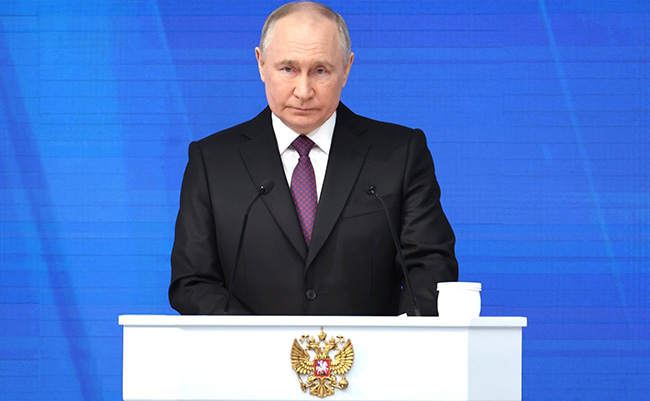 Photo: Kremlin.ru
Photo: Kremlin.ru
- I meet regularly with participants in the special military operation, including career military personnel and volunteers, as well as people of civilian professions who were mobilised for military service. All of them took up arms and rose in defence of our Motherland.
- You know, I look at these courageous men, sometimes very young men and, without exaggeration, I can say that my heart overflows with pride for our people, our nation and these people in particular. Without a doubt, people like them will not back down, fail or betray.
- They should take leading positions in the system of education and upbringing of young people, in public associations, state-run companies and privately held businesses, federal and municipal administration. They should head regions and enterprises, as well as major national projects. Some of these heroes and patriots are quite low-key and reserved in everyday life. They do not brag about their accomplishments, or talk big. But at pivotal moments in history, such people come to the fore and take responsibility. People who think about the country and live as one with it can be entrusted with the future of Russia.
- You know that the word “elite” has lost much of its credibility. Those who have done nothing for society and consider themselves a caste endowed with special rights and privileges – especially those who took advantage of all kinds of economic processes in the 1990s to line their pockets – are definitely not the elite. To reiterate, those who serve Russia, hard workers and military, reliable, trustworthy people who have proven their loyalty to Russia by deeds, in a word, dignified people are the genuine elite.
- Independence, self-sufficiency and sovereignty must be proven and reaffirmed every day. This is our responsibility for Russia’s present and future, something no else can do but us. This is about our Motherland, the Motherland of our ancestors, and no one will ever need it and treasure it the way we do – except our descendants, to whom we must pass on a strong and prosperous country.
- I consider it necessary to not only prepare a draft budget for the next three years but also to plan all major spending and investment further on, up to 2030. In other words, we must draft a perspective six-year plan for our national development that we will definitely supplement with new initiatives. Naturally, life will make its own adjustments to it.
- We are mapping out long-term plans despite this complicated period, despite the current trials and difficulties. The programme that I set out in the address today is based on facts and tackles fundamental matters. This is a programme of a strong sovereign country looking to the future with confidence. We have both resources and enormous opportunities to achieve the goals we set ourselves.
- We are one big family; we stand together and for this reason we will do everything we plan and desire and dream.
- I have faith in our victories, successes and the future of Russia!
read more in our Telegram-channel https://t.me/The_International_Affairs

 14:08 01.03.2024 •
14:08 01.03.2024 •
